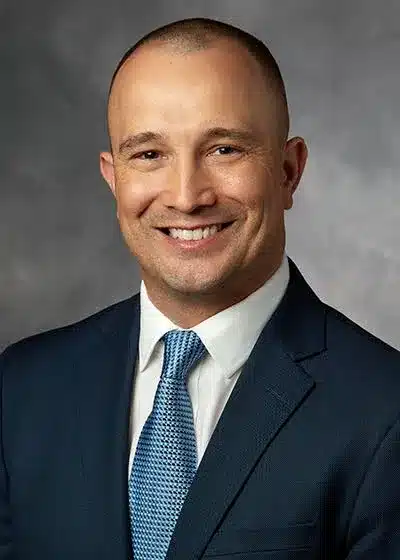Anyone who has Linkedin, has probably received a slew of messages from random individuals trying to connect—typically, these messages are harmless, though self-promoting in nature. I love connecting with people. I approve anyone who requests to connect with me via Linkedin, though I rarely respond to the messages that fill my inbox.
A few months back, I received an invitation to connect from Dr. Geoffrey Krampitz, a surgical oncologist at Sharp Healthcare, a local San Diego healthcare organization. Dr. Krampitz had quite the impressive resume displayed on his profile—a biomedical engineering degree from Johns Hopkins University and an MD and PhD from Stanford University School of Medicine (clearly, an underachiever). But it wasn’t his education and training that caught my eye—it was what he had written on his profile about the importance of human connection, whole-person care, and mental health, that drew me in.
I sat there, reading his bio, feeling at once hopeful and inspired by his words, and I thought to myself, Am I about to be that person who sends a random Linkedin message? As it turns out, yes, I was (am?) that person. I sent him a message detailing a little bit about myself, my practice, and my mental health blog, and even went so far as to ask him if he’d be interested in writing a guest post for me (sometimes, I’m brave like this).
With a few email exchanges and a couple of phone calls, Dr. Krampitz and I began talking about our shared experiences; experiences of trauma, resiliency, and our deep passion for healthcare, and incorporating mental health into medicine. It became apparent quite quickly, that our values and motives were in alignment. It is also through these interactions that I learned about his wife, Svetlana—a very talented clinician who now works as a therapist at my practice. And to think I almost didn’t send that message.
This blog post is written by Dr. Krampitz– physician, husband, father, and true survivor. In this post, he details the importance of mental health and medicine working together, to provide the best care possible. Whether you’re a provider, patient (or both), this post is for you.
As a surgical oncologist, I have the immense privilege of guiding patients through one of the most traumatic events in their lives—a cancer diagnosis. As I explain to patients and their loved ones their laboratory results, imaging studies, and pathology reports, and as I discuss with them the therapeutic options of surgery, chemotherapy, and radiation, and the sequence of treatment that will offer the best possible outcomes, I am keenly aware of the bomb that has just gone off inside their psyche. It’s almost as if I can hear the reverberations from the explosion. I can clearly see the confused and wounded looks on their faces as they wrestle with millions of questions echoing in their minds and as they attempt to make sense of the mind-numbing flood of information washing over them. What’s happening to them is not lost on me, for in this moment, they are experiencing a severe traumatic event.
I am no stranger to trauma. My perfect childhood came to a sudden end when my parents were brutally murdered near our farm in Costa Rica when I was seven years old. Days after the funeral, before I could come to terms with the loss of my parents, an American uncle whom I barely knew arranged for me to travel with him to Texas. After arriving in the United States, I was sent to live at a children’s home. Adjusting to life at the orphanage was arduous, especially with my limited English vocabulary. I struggled with anger and grief, but I found solace in the memory of my parents’ emphasis on learning. As my grasp of English improved, so did my academic performance. Instead of the many vices to which kids at the orphanage often turned to, education became my haven. My passion for surgery originally stemmed from my desire to prevent others from experiencing the same loss that I endured. I was initially drawn to trauma surgery, where the connection to my own experience was quite obvious. My interests eventually led me to surgical oncology, where the psychological trauma is more obscure, but nonetheless, just as menacing.

Medical treatment for cancer focuses primarily on treating the physical aspects of the disease to achieve the best survival and quality of life outcomes for patients. The psychosocial distress of cancer is often overlooked or underemphasized by clinicians. However, failure to address distress may compromise the very clinical outcomes physicians strive to achieve. Chronic stress and depression are associated with decreased survival outcomes in cancer, as they adversely affect almost every organ system, and promote cancer progression. The National Comprehensive Cancer Network guidelines suggest that all cancer patients be screened for psychosocial distress. However, research tells us that the majority of cancer patients are NOT routinely screened for distress, and therefore, they are not referred for mental health services.
Recognizing distress is more difficult than it sounds. Although the prevalence of severe distress in cancer patients approaches 40%, studies show that physicians do a poor job of identifying these patients. This is due, in part, because many patients do not appreciate the level of distress within themselves. Suppression is not unusual in victims of intense trauma. Although I endured the tangible hardships that resulted from my parents’ murder, I was unaware of the profound affects the traumas had on me emotionally. Although I was educated at some of the most elite academic institutions, I did not associate the mental health training I received to my own circumstance, and thus I remained in denial of the void that was caused by my childhood losses. Subconsciously, I felt that acknowledging the damage would somehow erode the impenetrable walls I had built to prevent myself from having to sit with the pain of my trauma. Nevertheless, my capacity for connecting to others had degraded, and my fear of attachment would disrupt every subsequent, meaningful relationship I had. It was not until I met a brilliant therapist-in-training (who would later become my wife), that I began to link all the pieces. I am blessed to have found such a patient and nurturing partner that helped me acknowledge the emotional toll caused by my loss and accept vulnerability as the first step towards developing healthy relationships with others.
My goal is to translate my own experience to help guide patients through the physical and mental traumas of a cancer diagnosis and treatment. Not surprisingly, many of my patients are reluctant to treat the emotional component of their disease with the same fervor as the physical elements of their cancer. I see many of the same avoidance and rationalization techniques that I used to circumvent the difficulties of my own emotional trauma. I hear from patients the same misconceptions about therapy to which I previously erroneously subscribed. However, I have learned that these tactics are short-term survival mechanisms that undermine long-term mental health. My hope is to connect every cancer patient to a compassionate and supportive therapist that can help them organize and understand the intense emotions that accompany their cancer diagnosis and treatment. I also aim to encourage other physicians to address the psychosocial distress of patients with the same commitment as the physical aspects of cancer. Caring for only the corporal aspect of cancer fails to treat the whole patient and ignores an equally important component of the grueling experience for patients. Only by addressing both the physical and psychological damage caused by cancer can physicians provide truly comprehensive care and optimize the survival and quality of life outcomes for patients.
by: Dr. Geoffrey Krampitz, M.D., Ph.D.


